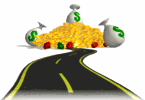Saving for a Rainy Day: The importance of stashing your cash.
|
|
|
Perhaps you find saving money is hard when all your money goes to pay bills. What can you do?
Look at your daily purchases. Little things add up!  From buying your lunch or stopping for a latte to getting sodas from a vending machine. If you spend just $2.20 a day for beverages, this adds up quickly to more than $500 a year! From buying your lunch or stopping for a latte to getting sodas from a vending machine. If you spend just $2.20 a day for beverages, this adds up quickly to more than $500 a year!
Examine your spending habits for things that you consider "necessities" but really may be "extras," like cable TV, fast food, manicures or video rentals.
 Comparison shop for things that really are necessities such as food, transportation and insurance. Comparison shop for things that really are necessities such as food, transportation and insurance.
Think of savings as one of your expenses. When you pay bills, write your first check to savings.
A rule of thumb is to pay yourself 10% of all your income first before any other bills. You’ll be surprised how quickly your savings will grow.
Many people like to save money that isn’t needed right away by depositing it into a savings account at their credit union, bank or thrift. |
 Saving allows you to make big purchases for things like a car, trip, furniture or house and for use in retirement. Saving allows you to make big purchases for things like a car, trip, furniture or house and for use in retirement.
Savings accounts earn interest and your money is safe: each FDIC- and NCUA-insured savings account is guaranteed up to $250,000. Although you can take money out any time you want, somehow if the money’s in an account, you’re less likely to spend it.
 Before you open a savings account, you’ll want to look at its rules. Sometimes you have to have a certain amount of money (minimum balance) to open an account, although the minimum may be as low as $5.00. Before you open a savings account, you’ll want to look at its rules. Sometimes you have to have a certain amount of money (minimum balance) to open an account, although the minimum may be as low as $5.00.
 Check out the interest rates. Some savings accounts pay higher interest if you keep a certain amount in them. Check out the interest rates. Some savings accounts pay higher interest if you keep a certain amount in them.
Some credit unions and banks charge monthly fees on each account, but you may be able to get them to waive (or remove) this fee if you keep a minimum balance. | |
|
|
|
Often you can get an ATM Card when you open your account, but check to see if there is a fee for using it.
Years ago before computers, nearly all savings accounts were Passbook Savings Accounts. Your credit union or bank gave you a little book with columns in it.  Every time you put money in your account (made a deposit), you wrote the amount into your passbook. Every time you took money out (made a withdrawal), you wrote that in too. The teller filled in your interest. If you lost your passbook, you had to pay a fine. Every time you put money in your account (made a deposit), you wrote the amount into your passbook. Every time you took money out (made a withdrawal), you wrote that in too. The teller filled in your interest. If you lost your passbook, you had to pay a fine.
Most credit unions and banks still offer Passbook Savings Accounts, but Statement Savings Accounts have become more popular. In this case, the credit union or bank mails (or emails) you a statement monthly or quarterly (four times a year). The statement is a record of all your deposits and withdrawals and the amount of interest you earned.
 With a statement account, you don’t even have to go to the bank to deposit money. You can have it transferred electronically from another one of your accounts, or you can have your employer deposit your paycheck automatically by computer. This is called "direct deposit." With a statement account, you don’t even have to go to the bank to deposit money. You can have it transferred electronically from another one of your accounts, or you can have your employer deposit your paycheck automatically by computer. This is called "direct deposit."
|
Some people take out Holiday Club Savings Accounts . Starting inJanuary, they deposit money every week for fifty weeks.  When the holiday season comes around, they have saved up enough to pay for their presents and celebrations. Usually, they pay a penalty if they take the money out before the holidays. When the holiday season comes around, they have saved up enough to pay for their presents and celebrations. Usually, they pay a penalty if they take the money out before the holidays.
When you open up your savings or holiday club account, you will have to fill out a form. You usually need your driver’s license and Social Security number. They may ask you to sign "signature cards" so they have more than one copy of your signature. If you are opening up a joint account with another person, he or she will have to fill out an application, too.
 And don’t forget to bring the money to deposit so that you can start down the path to savings! And don’t forget to bring the money to deposit so that you can start down the path to savings!
To learn about more ways to save money, see the related links.
See what you learned.
Check out
"Better than a Mattress" | |           |
Did this answer your question?